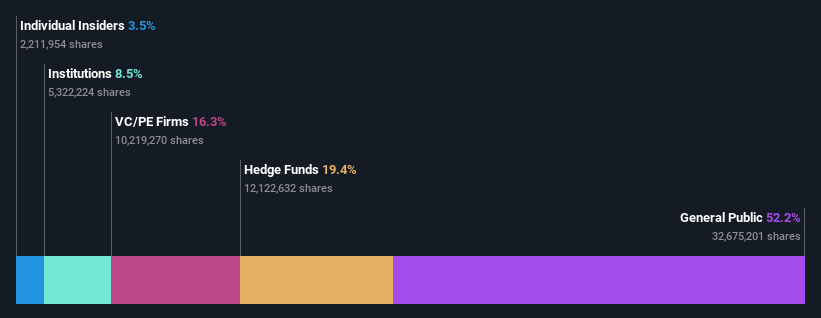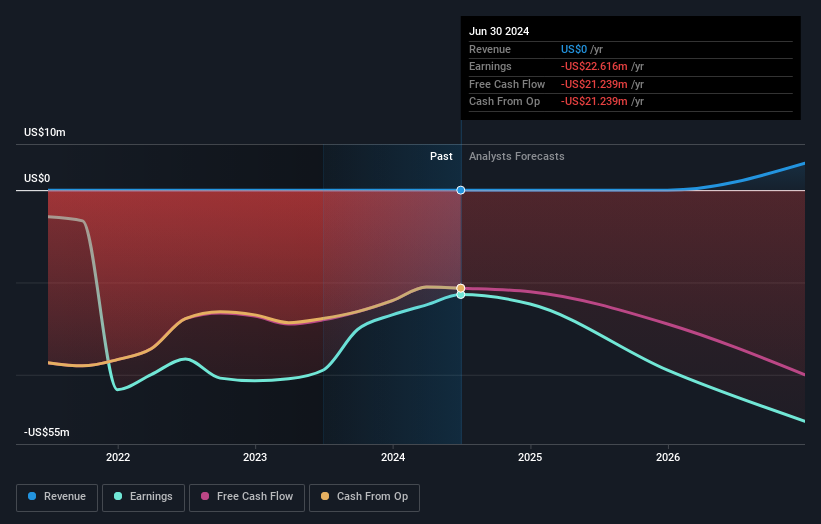- United States
- /
- Biotech
- /
- NasdaqGM:CRVS
Retail investors among Corvus Pharmaceuticals, Inc.'s (NASDAQ:CRVS) largest shareholders, saw gain in holdings value after stock jumped 10% last week

Key Insights
- Significant control over Corvus Pharmaceuticals by retail investors implies that the general public has more power to influence management and governance-related decisions
- The top 25 shareholders own 47% of the company
- Ownership research along with analyst forecasts data help provide a good understanding of opportunities in a stock
To get a sense of who is truly in control of Corvus Pharmaceuticals, Inc. (NASDAQ:CRVS), it is important to understand the ownership structure of the business. And the group that holds the biggest piece of the pie are retail investors with 52% ownership. Put another way, the group faces the maximum upside potential (or downside risk).
As a result, retail investors were the biggest beneficiaries of last week’s 10% gain.
In the chart below, we zoom in on the different ownership groups of Corvus Pharmaceuticals.
View our latest analysis for Corvus Pharmaceuticals

What Does The Institutional Ownership Tell Us About Corvus Pharmaceuticals?
Institutional investors commonly compare their own returns to the returns of a commonly followed index. So they generally do consider buying larger companies that are included in the relevant benchmark index.
Corvus Pharmaceuticals already has institutions on the share registry. Indeed, they own a respectable stake in the company. This implies the analysts working for those institutions have looked at the stock and they like it. But just like anyone else, they could be wrong. If multiple institutions change their view on a stock at the same time, you could see the share price drop fast. It's therefore worth looking at Corvus Pharmaceuticals' earnings history below. Of course, the future is what really matters.

It looks like hedge funds own 19% of Corvus Pharmaceuticals shares. That's interesting, because hedge funds can be quite active and activist. Many look for medium term catalysts that will drive the share price higher. Looking at our data, we can see that the largest shareholder is OrbiMed Advisors LLC with 11% of shares outstanding. For context, the second largest shareholder holds about 9.8% of the shares outstanding, followed by an ownership of 9.6% by the third-largest shareholder. Additionally, the company's CEO Richard Miller directly holds 2.8% of the total shares outstanding.
On studying our ownership data, we found that 25 of the top shareholders collectively own less than 50% of the share register, implying that no single individual has a majority interest.
While studying institutional ownership for a company can add value to your research, it is also a good practice to research analyst recommendations to get a deeper understand of a stock's expected performance. There are a reasonable number of analysts covering the stock, so it might be useful to find out their aggregate view on the future.
Insider Ownership Of Corvus Pharmaceuticals
The definition of company insiders can be subjective and does vary between jurisdictions. Our data reflects individual insiders, capturing board members at the very least. Management ultimately answers to the board. However, it is not uncommon for managers to be executive board members, especially if they are a founder or the CEO.
I generally consider insider ownership to be a good thing. However, on some occasions it makes it more difficult for other shareholders to hold the board accountable for decisions.
Shareholders would probably be interested to learn that insiders own shares in Corvus Pharmaceuticals, Inc.. As individuals, the insiders collectively own US$9.9m worth of the US$280m company. Some would say this shows alignment of interests between shareholders and the board. But it might be worth checking if those insiders have been selling.
General Public Ownership
The general public -- including retail investors -- own 52% of Corvus Pharmaceuticals. This size of ownership gives investors from the general public some collective power. They can and probably do influence decisions on executive compensation, dividend policies and proposed business acquisitions.
Private Equity Ownership
With a stake of 16%, private equity firms could influence the Corvus Pharmaceuticals board. Sometimes we see private equity stick around for the long term, but generally speaking they have a shorter investment horizon and -- as the name suggests -- don't invest in public companies much. After some time they may look to sell and redeploy capital elsewhere.
Next Steps:
It's always worth thinking about the different groups who own shares in a company. But to understand Corvus Pharmaceuticals better, we need to consider many other factors. Consider for instance, the ever-present spectre of investment risk. We've identified 5 warning signs with Corvus Pharmaceuticals (at least 2 which are significant) , and understanding them should be part of your investment process.
If you would prefer discover what analysts are predicting in terms of future growth, do not miss this free report on analyst forecasts.
NB: Figures in this article are calculated using data from the last twelve months, which refer to the 12-month period ending on the last date of the month the financial statement is dated. This may not be consistent with full year annual report figures.
New: AI Stock Screener & Alerts
Our new AI Stock Screener scans the market every day to uncover opportunities.
• Dividend Powerhouses (3%+ Yield)
• Undervalued Small Caps with Insider Buying
• High growth Tech and AI Companies
Or build your own from over 50 metrics.
Have feedback on this article? Concerned about the content? Get in touch with us directly. Alternatively, email editorial-team (at) simplywallst.com.
This article by Simply Wall St is general in nature. We provide commentary based on historical data and analyst forecasts only using an unbiased methodology and our articles are not intended to be financial advice. It does not constitute a recommendation to buy or sell any stock, and does not take account of your objectives, or your financial situation. We aim to bring you long-term focused analysis driven by fundamental data. Note that our analysis may not factor in the latest price-sensitive company announcements or qualitative material. Simply Wall St has no position in any stocks mentioned.
About NasdaqGM:CRVS
Corvus Pharmaceuticals
A clinical stage biopharmaceutical company, focuses on the development and commercialization of immune modulator product candidates to treat solid cancers, T cell lymphomas, autoimmune, allergic, and infectious diseases.
Adequate balance sheet slight.
Market Insights
Community Narratives




